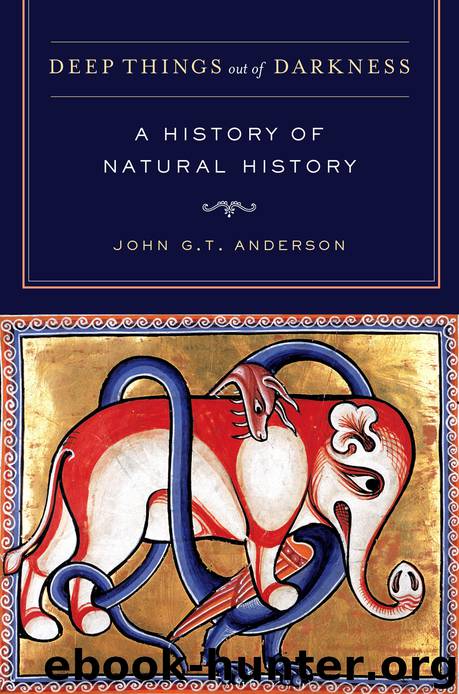Deep Things Out of Darkness by Anderson John G. T.;

Author:Anderson, John G. T.;
Language: eng
Format: epub
Publisher: University of California Press
Published: 2018-09-14T16:00:00+00:00
TWELVE · Spoils of Other Empires
From the fifteenth through the first third of the twentieth centuries, the nations of Europe moved outward, conquering much of the rest of the world, destroying or subduing local human populations, and in some cases transforming large areas of other continents to resemble the European homeland. At its peak at the beginning of the twentieth century, the British Empire ruled over a quarter of the land surface of the earth and also over more than 425 million people, out of a global population of fewer than two billion.1 Other European countries never quite achieved this scale, but not for want of trying.
In a world in which envoys could take months to travel out from a capital, see what there was to see, and return home for consultation, a great deal of discretion inevitably had to be left to the people on the spot. In addition, particularly in the case of the British Empire, private enterprise often led the way, with government coming along later. Much of what was to become first the Indian Empire, and later modern India, Bangladesh, and Pakistan, was originally put together by the East India Company and taken over by the Crown only after the Mutiny. Likewise, the borders and much of the development of modern Canada were in large part the results of the private Hudson's Bay Company, rather than an act of deliberate planning on the part of London. Where this all becomes important in terms of a history of natural history is that the blending of commercial and political interests, coupled with the high degree of autonomy granted to people willing to live on the frontiers, created both the space and the need for detailed information about the plants, animals, climate, and geology of areas acquired in an often haphazard way by rival imperial powers. One may abhor the politics, cultural impact, and loss of lives, but the gain to science was enormous.
As a note before we continue, it is worth considering what we mean by “discovering” a place or naming a plant, animal, or place. With the exception of Antarctica, humans had been discovering, naming, and living in most of the world for tens of thousands of years before the age of empires. When we say “discovered,” we mean discovered to our own meanings and culture and time. It has become popular in recent years to emphasize the negative side of empire and exploration—thus Columbus has been transformed in my lifetime from hero to villain. Truth is seldom that simple; we are all heroes in our own stories but often knaves in someone else's. Again, I think it is possible to regret the negatives while at the same time acknowledging that these explorers were very brave people in very particular situations that often brought out both the best and the worst in human nature.
At the beginning of the Imperial Age, many voyages of exploration and discovery were fairly explicitly about loot when everything went well, and survival when it didn't.
Download
This site does not store any files on its server. We only index and link to content provided by other sites. Please contact the content providers to delete copyright contents if any and email us, we'll remove relevant links or contents immediately.
The Lonely City by Olivia Laing(4796)
Animal Frequency by Melissa Alvarez(4459)
All Creatures Great and Small by James Herriot(4306)
Walking by Henry David Thoreau(3950)
Exit West by Mohsin Hamid(3822)
Origin Story: A Big History of Everything by David Christian(3680)
COSMOS by Carl Sagan(3617)
How to Read Water: Clues and Patterns from Puddles to the Sea (Natural Navigation) by Tristan Gooley(3458)
Hedgerow by John Wright(3352)
How to Read Nature by Tristan Gooley(3332)
The Inner Life of Animals by Peter Wohlleben(3303)
How to Do Nothing by Jenny Odell(3292)
Project Animal Farm: An Accidental Journey into the Secret World of Farming and the Truth About Our Food by Sonia Faruqi(3212)
Origin Story by David Christian(3192)
Water by Ian Miller(3176)
A Forest Journey by John Perlin(3066)
The Plant Messiah by Carlos Magdalena(2922)
A Wilder Time by William E. Glassley(2855)
Forests: A Very Short Introduction by Jaboury Ghazoul(2836)
